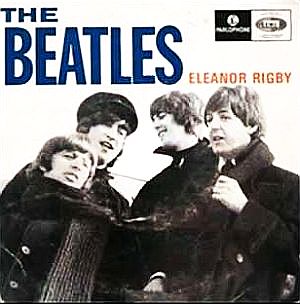May 13, 2020 —– Chart #31
Hello Musical Friends,
Hope you are enjoying these daily emails. I intend to keep this up as long as we are in lockdown. Thereafter I will continue, but less frequently or until you tell me to stop! Also today I am sending a revised version of Gorgon Lightfoot’s “Sundown” thanks to friend and fellow BYO Musician member Doug McHard who showed me a more accurate finger placement for the signature guitar part. Thanks Doug!
Today we are going back to one of my all-time favorite bands. In fact, expect to see numerous future offerings from the Fab Four. “Eleanor Rigby” is a song by the English rock band the Beatles released on their 1966 album Revolver and as a single with “Yellow Submarine“. It was written primarily by Paul McCartney and credited to Lennon–McCartney. The song continued the transformation of the Beatles from a mainly rock and roll- and pop-oriented act to a more experimental, studio-based band. With a double string quartet arrangement by George Martin and striking lyrics about loneliness, “Eleanor Rigby” broke sharply with popular music conventions, both musically and lyrically. Richie Unterberger of AllMusic cites the band’s “singing about the neglected concerns and fates of the elderly” on the song as “just one example of why the Beatles’ appeal reached so far beyond the traditional rock audience”.
Simultaneously released on 5 August 1966 on both the album Revolver and on a double A-side single with “Yellow Submarine” on Parlophone in the United Kingdom and Capitol in the United States, “Eleanor Rigby” spent four weeks at number one on the British charts, but in America it only reached #11, with “Yellow Submarine” charting separately at #2.
Paul McCartney came up with the melody of “Eleanor Rigby” as he experimented on his piano. However, the original name of the protagonist that he chose was not Eleanor Rigby, but Miss Daisy Hawkins. The singer-composer Donovan reported that he heard McCartney play it to him before it was finished, with completely different lyrics. In 1966, McCartney recalled how he got the idea for his song:
I was sitting at the piano when I thought of it. The first few bars just came to me, and I got this name in my head … “Daisy Hawkins picks up the rice in the church”. I don’t know why. I couldn’t think of much more so I put it away for a day. Then the name “Father McCartney” came to me, and all the lonely people. But I thought that people would think it was supposed to be about my Dad sitting knitting his socks. Dad’s a happy lad. So I went through the telephone book and I got the name “McKenzie”.
Others have posited that “Father McKenzie” refers to “Father” Tommy McKenzie, who was the compere at Northwich Memorial Hall.
McCartney said he came up with the name “Eleanor” from actress Eleanor Bron, who had starred with the Beatles in the film Help!. “Rigby” came from the name of a store in Bristol, “Rigby & Evens Ltd, Wine & Spirit Shippers”, which he noticed while seeing his girlfriend of the time, Jane Asher, act in The Happiest Days of Your Life. He recalled in 1984, “I just liked the name. I was looking for a name that sounded natural. ‘Eleanor Rigby’ sounded natural.”
It was one of several songs in this period which evoked a past era by using female given names which have since become very popular again, but which were rarely given among baby boomers, the main pop audience at the time. Others include “See Emily Play” by Pink Floyd, where the then-rare name evoked a sense of Victoriana, and “Pictures of Lily” by The Who, which specifically refers to Lillie Langtry.
McCartney wrote the first verse by himself, and the Beatles finished the song in the music room of John Lennon’s home at Kenwood. John Lennon, George Harrison, Ringo Starr and Lennon’s childhood friend Pete Shotton all listened to McCartney play his song through and contributed ideas. Harrison came up with the “Ah, look at all the lonely people” hook. Starr contributed the line “writing the words of a sermon that no one will hear” and suggested making “Father McCartney” darn his socks, which McCartney liked. It was then that Shotton suggested that McCartney change the name of the priest, in case listeners mistook the fictional character in the song for McCartney’s own father.
The song is often described as a lament for lonely people or a commentary on post-war life in Britain.
McCartney could not decide how to end the song, and Shotton finally suggested that the two lonely people come together too late as Father McKenzie conducts Eleanor Rigby’s funeral. At the time, Lennon rejected the idea out of hand, but McCartney said nothing and used the idea to finish off the song, later acknowledging Shotton’s help.
Lennon was quoted in 1971 as having said that he “wrote a good half of the lyrics or more” and in 1980 claimed that he wrote all but the first verse, but Shotton remembered Lennon’s contribution as being “absolutely nil”. McCartney said that “John helped me on a few words but I’d put it down 80–20 to me, something like that.”
“Eleanor Rigby” does not have a standard pop backing. None of the Beatles played instruments on it, though John Lennon and George Harrison did contribute harmony vocals. Like the earlier song “Yesterday”, “Eleanor Rigby” employs a classical string ensemble—in this case an octet of studio musicians, comprising four violins, two violas, and two cellos, all performing a score composed by producer George Martin.
Keep Rockin’,
Stan
